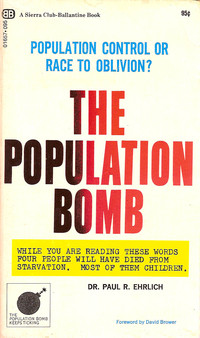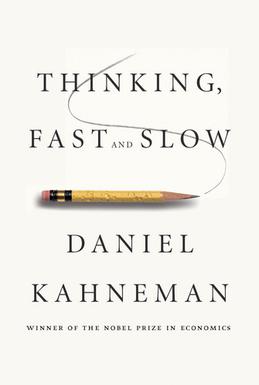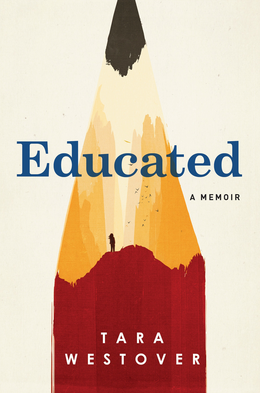
William Henry Gates III is an American businessman and philanthropist best known for co-founding the software company Microsoft with his childhood friend Paul Allen. He later held the positions of chairman, chief executive officer (CEO), president, and chief software architect of the company. Gates was also its largest individual shareholder until May 2014. He was a pioneer of the microcomputer revolution of the 1970s and 1980s.

The Population Bomb is a 1968 book co-authored by former Stanford University professor Paul R. Ehrlich and former Stanford senior researcher in conservation biology Anne H. Ehrlich. From the opening page, it predicted worldwide famines due to overpopulation, as well as other major societal upheavals, and advocated immediate action to limit population growth. Fears of a "population explosion" existed in the mid-20th century baby boom years, but the book and its authors brought the idea to an even wider audience.

A picture book combines visual and verbal narratives in a book format, most often aimed at young children. With the narrative told primarily through text, they are distinct from comics, which do so primarily through sequential images.

The Giver is a 1993 American young adult dystopian novel written by Lois Lowry, set in a society which at first appears to be utopian but is revealed to be dystopian as the story progresses.

Meliorism is the idea that progress is a real concept and that humans can interfere with natural processes in order to improve the world.

Stargateliterature comprises the novels and short stories in the Stargate franchise fictional universe as well as a non-fiction devoted to the franchise. Stargate literary works follow no strict continuity with the series or each other and are often considered to be non-canon. There is a period of roughly a year between the original idea for a novel and the finalized product, causing problems for authors as they are unaware as to how the franchise will develop and change during the writing process. Despite this, the editors of Stargate literature function as the medium between the author and the production company.
Simon Slater is a British music director, composer, narrator, and actor. He has composed more than 300 original music scores for film, theatre, TV and radio, and is a member of the British Academy of Composers and Songwriters.

Hans Rosling was a Swedish physician, academic and public speaker. He was a professor of international health at Karolinska Institute and was the co-founder and chairman of the Gapminder Foundation, which developed the Trendalyzer software system. Widely regarded as one of the most influential physicians and geographers in the modern world, he held presentations around the world, including several TED Talks in which he promoted the use of data to explore development issues. His posthumously published book Factfulness, coauthored with his daughter-in-law Anna Rosling Rönnlund and son Ola Rosling, became an international bestseller.
Optimism bias or optimistic bias is a cognitive bias that causes someone to believe that they themselves are less likely to experience a negative event. It is also known as unrealistic optimism or comparative optimism. It is common and transcends gender, ethnicity, nationality, and age. Autistic people are less susceptible to this kind of bias. It has also been reported in other animals, such as rats and birds.
Don't Panic — The Truth about Population is a 2013 documentary about human overpopulation produced by Wingspan Productions and The Open University for the BBC as part of the This World series and presented by Swedish statistician Hans Rosling of the Gapminder Foundation. The documentary combines a lecture by Rosling, showing Musion 3D infographics in front of him, with film sequences featuring exemplary stories in different regions in the world. One film section is about a family planning worker in Bangladesh, where the life expectancy increased from less than 50 years in 1972 to over 70, while the number of children per woman declined from more than seven to less than 2.5 in average, and is still falling. Rosling states that this number is representative worldwide, the reason why the total number of children globally is now at a stable level of 2 billions. According to him, the so-called population explosion has already been overcome. The human population will peak at eleven billions, and stabilize at this level by the end of the century.
Gapminder Foundation is a non-profit venture registered in Stockholm, Sweden, that promotes sustainable global development and achievement of the United Nations Millennium Development Goals by increased use and understanding of statistics and other information about social, economic, and environmental development at local, national, and global levels.

The Better Angels of Our Nature: Why Violence Has Declined is a 2011 book by Steven Pinker, in which the author argues that violence in the world has declined both in the long run and in the short run and suggests explanations as to why this has occurred. The book uses data documenting declining violence across time and geography. This paints a picture of massive declines in the violence of all forms, from war, to improved treatment of children. He highlights the role of nation-state monopolies on force, of commerce, of increased literacy and communication, as well as a rise in a rational problem-solving orientation as possible causes of this decline in violence. He notes that paradoxically, our impression of violence has not tracked this decline, perhaps because of increased communication, and that further decline is not inevitable, but is contingent on forces harnessing our better motivations such as empathy and increases in reason.

Thinking, Fast and Slow is a 2011 popular science book by psychologist Daniel Kahneman. The book's main thesis is a differentiation between two modes of thought: "System 1" is fast, instinctive and emotional; "System 2" is slower, more deliberative, and more logical.

Sapiens: A Brief History of Humankind is a book by Yuval Noah Harari, based on a series of lectures he taught at The Hebrew University of Jerusalem. It was first published in Hebrew in Israel in 2011, and in English in 2014. The book focuses on Homo sapiens, and surveys the history of humankind, starting from the Stone Age and going up to the 21st century. The account is situated within a framework that intersects the natural sciences with the social sciences.

Ola Rosling is a Swedish statistician known for his work for the Gapminder Foundation on changing global quality of life. He is the chairman, director and co-founder of the foundation.
Hassan Damluji is a British-Iraqi development expert and author. He is the co-founder of the think-tank Global Nation, which focuses on improving international cooperation to tackle issues like climate change and pandemics. He is a senior fellow at the London School of Economics, and formerly Deputy Director at the Bill and Melinda Gates Foundation. He is the author of the Responsible Globalist, published by Penguin Allen Lane in 2019, and described by Bill Gates as "Thought provoking and well-written... a good read for people who care about solving global problems.".

Trump 101: The Way to Success is a book credited to Donald Trump and written by ghostwriter Meredith McIver. The first edition was published in hardcover format by Wiley in 2006. The book contains twenty-four chapters imparting advice on business acumen with quotations included from Trump. The authors caution the reader about the inherent risks seen in business deals, and advise individuals to promptly deal with conflicts. Trump recommends other books including The Art of War and The Power of Positive Thinking, as well as his company Trump University.

Tara Westover is an American memoirist, essayist and historian. Her memoir Educated (2018) debuted at No. 1 on The New York Times bestseller list and was a finalist for a number of national awards, including the LA Times Book Prize, PEN America's Jean Stein Book Award, and two awards from the National Book Critics Circle Award. The New York Times ranked Educated as one of the 10 Best Books of 2018. Westover was chosen by Time magazine as one of the 100 most influential people of 2019.

Anna Rosling Rönnlund is a Swedish designer who, with her husband Ola Rosling, developed Trendalyzer, interactive software for visualizing statistical information. After Trendalyzer was sold to Google in 2007, the couple continued work on its development until August 2010.

Educated is a 2018 memoir by the American author Tara Westover. Westover recounts overcoming her survivalist Mormon family in order to go to college, and emphasizes the importance of education in enlarging her world. She details her journey from her isolated life in the mountains of Idaho to completing a PhD program in history at Cambridge University. She started college at the age of 17 having had no formal education. She explores her struggle to reconcile her desire to learn with the world she inhabited with her father.
















